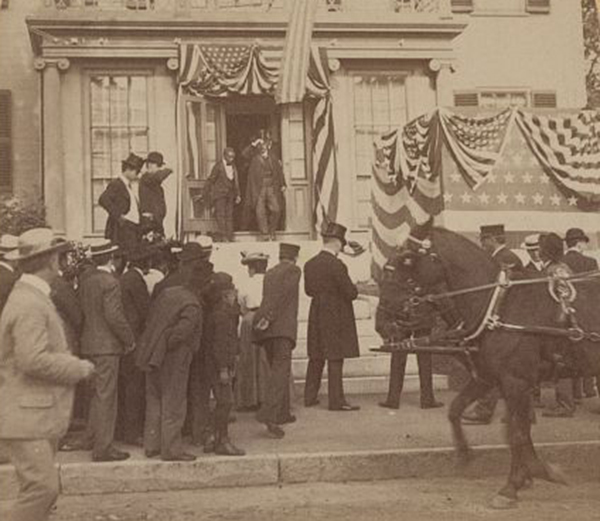Aug. 27, 1902: A train hauling five special Pullman cars brings President Theodore Roosevelt and state and local dignitaries to Bangor, where it arrives at noon at the city’s western train station to the hurrahs of hundreds of onlookers gathered on Railroad Street.

Rail yardmen rush up, remove their caps and stand several feet from the president. He acknowledges them, removes his silk hat, and bows. Everyone cheers.
Gussied-up carriages take Roosevelt and his party to the Bangor House, the city’s best-known hotel, with crowds lining the streets the whole way. Then Roosevelt gets a tour of the city. He passes along flag-festooned, spectator-lined streets, past houses decorated for the occasion and the flower-covered Children’s Home, draped with bunting and ringed by excited children.
The carriages stop. The children sing a song. A girl gives Roosevelt a bouquet. He signs the home’s guest book.
By the time the entourage returns to the Bangor House, the crowd there has grown from hundreds to thousands. Roosevelt steps inside and appears on a balcony overlooking the street, inspiring more cheers and waving handkerchiefs. He speaks for five minutes, recalling the spirit that helped the North win the Civil War.
“There isn’t any patent cure-all to get good government,” he says. “Each man must do his duty and no more. Questions of birth and station mustn’t be given place. When you who were in the Union army went into battle, you didn’t bother about the antecedents of the men at your right and at your left. You wanted to be sure that they would stay put. We must strengthen the government by paying heed to the fundamental principles of American manhood.”
Later, a gun salute heralds his arrival at Maplewood Park, which teems with a swaying, swooning audience. He rises on a platform at 3:08 p.m. and, apparently mindful of Maine’s rural character, launches into a paean to American farm life. He notes that farming, while still fostering cherished traditions, has progressed and become an “applied science.”
“But after all this has been said,” he notes, “it remains true that the countryman, the man on the farm, more than any other of our citizens today, is called upon continually to exercise the qualities which we would like to think of as typical of the United States throughout its history – the qualities of rugged independence, masterful resolution and individual energy and resourcefulness.”
Then, after a homily about moral standards that might be mistaken for one given by a local parson, he and his party shake hands, squeeze through the crowd, provoke another gun salute, and return to the Bangor House. They wait there until 4:15, when carriages take the president and his retinue back to the train station, where they depart for another engagement in Ellsworth.
So much activity in less than five hours, so much frenetic hustling here and there might have cowed someone else, but not Roosevelt, a former rancher, deputy sheriff, wilderness explorer and police commissioner.
And he was, after all, a Rough Rider.
Presented by:

Joseph Owen is an author, retired newspaper editor and board member of the Kennebec Historical Society. Owen’s book, “This Day in Maine,” can be ordered at islandportpress.com. To get a signed copy use promo code signedbyjoe at checkout. Joe can be contacted at: jowen@mainetoday.com.
Send questions/comments to the editors.



Success. Please wait for the page to reload. If the page does not reload within 5 seconds, please refresh the page.
Enter your email and password to access comments.
Hi, to comment on stories you must . This profile is in addition to your subscription and website login.
Already have a commenting profile? .
Invalid username/password.
Please check your email to confirm and complete your registration.
Only subscribers are eligible to post comments. Please subscribe or login first for digital access. Here’s why.
Use the form below to reset your password. When you've submitted your account email, we will send an email with a reset code.